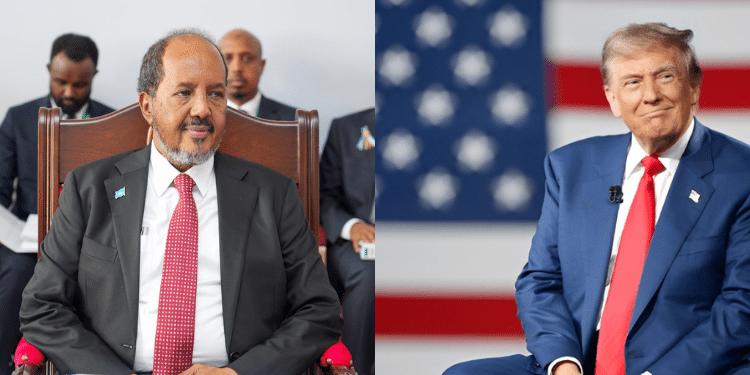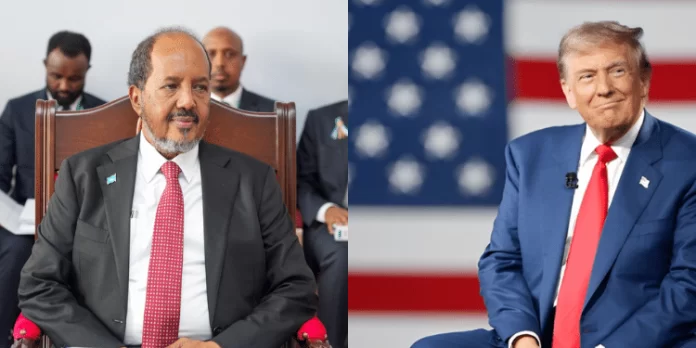The collapse of U.S. confidence in President Hassan Sheikh Mohamud didn’t include a press launch. It got here with a leak—a chilly, calculated launch of a non-public letter from the Somali president to the U.S. President Donald J. Trump. The letter itself was unremarkable, however its disclosure was something however unintentional. It was a warning. Broadly interpreted as a deliberate act of dissent from throughout the U.S. Embassy in Mogadishu, the leak signaled the top of Washington’s endurance with Mohamud’s management—a relationship that had been steadily unraveling for months.
The letter—meant to safe U.S. help—backfired. It uncovered a weakened president pleading for assist whereas his authorities misplaced credibility domestically and internationally. In response to a number of sources, the leak originated from embassy officers fed up with President Mohamud’s defiance, paranoia, and inaction. “This was not an accident,” mentioned one senior U.S. official. “It was a deliberate sign that the connection is over.”
That sign marked a decisive rupture between President Hassan Sheikh Mohamud and the American diplomatic institution. U.S. and regional officers level to his failure to regulate Somalia’s safety panorama and his obstruction of counterterrorism efforts. “The leak was a shot throughout the bow,” mentioned one other senior official. “We’re finished overlaying for him.”
The fallout follows months of unfulfilled commitments, strategic defiance, and a sample of provocation. Tensions peaked when Mohamud’s authorities publicly dismissed a U.S. Embassy safety advisory, calling it baseless—a transfer seen as each reckless and intentionally antagonistic. The ultimate blow got here when he delayed firing his Protection Minister regardless of repeated U.S. requests. When he lastly acted, he blamed U.S. strain, triggering backlash in Washington. Officers noticed this as an try and undermine American diplomacy and shift accountability.
Contained in the White Home, the decision is obvious: “He’s out of alignment with each key regional and safety curiosity we now have,” mentioned a senior administration official.
The Trump administration is now exploring different Somali leaders—those that can restore institutional credibility, rebuild belief, and cooperate on counterterrorism. Throughout the State Division, Pentagon, and Nationwide Safety Council, officers describe Mohamud as unreliable, politically paralyzed, and self-interested. Throughout the U.S. Embassy in Mogadishu, the temper is described as one in all chilly hostility, pushed by what many see as a sample of lies, damaged guarantees, veiled offers with international actors, and rising paranoia. “There’s a shared view now,” mentioned one diplomat. “He’s harmful to Somalia, and he can’t be trusted. He says the fitting issues behind closed doorways however continually undermines U.S. efforts on the bottom.”
With Washington’s endurance exhausted, the coverage dialog has shifted to contingency planning. Senior officers are engaged in inner discussions over a possible political realignment in Somalia.
“The query is now not if there will likely be a transition,” mentioned a Nationwide Safety Council official. “It’s when—and the way quickly.” Nobody is looking it regime change, however nobody is defending Mohamud both. “His credibility is gone. So is our endurance.”
Extra broadly, regional companions have grown alarmed by Mohamud’s inconsistent and transactional diplomacy. Officers in Cairo, Riyadh, Abu Dhabi, Doha, Nairobi, and Addis Ababa, who’ve lengthy expressed concern over his erratic posture, now view his management as a supply of regional instability and confusion—not due to one particular alignment, however due to a broader sample of half-truths, damaged guarantees, contradictory offers, and beginner statecraft.
* In Cairo, officers are pissed off by Mohamud’s simultaneous outreach to Ethiopia, a direct competitor, after having publicly dedicated to Egypt’s place on the Nile dispute—a transfer seen as duplicitous and reckless.
* In Abu Dhabi, diplomats cite repeated situations the place Mohamud has agreed to regional safety cooperation, solely to later backtrack or sideline Gulf-led initiatives in favor of advert hoc bilateral offers elsewhere.
* Even Riyadh and Doha, which had maintained extra impartial ties, have begun to step again, describing Somalia’s international coverage beneath Mohamud as chaotic, contradictory, and pushed by short-term political wants slightly than strategic imaginative and prescient.
For now, President Hassan Sheikh Mohamud stays in workplace. However his authorities is remoted, his allies are vanishing, and his enemies—inside and out of doors the nation—are circling. The letter meant to save lots of his presidency might as a substitute turn out to be the doc that sealed its unraveling.










